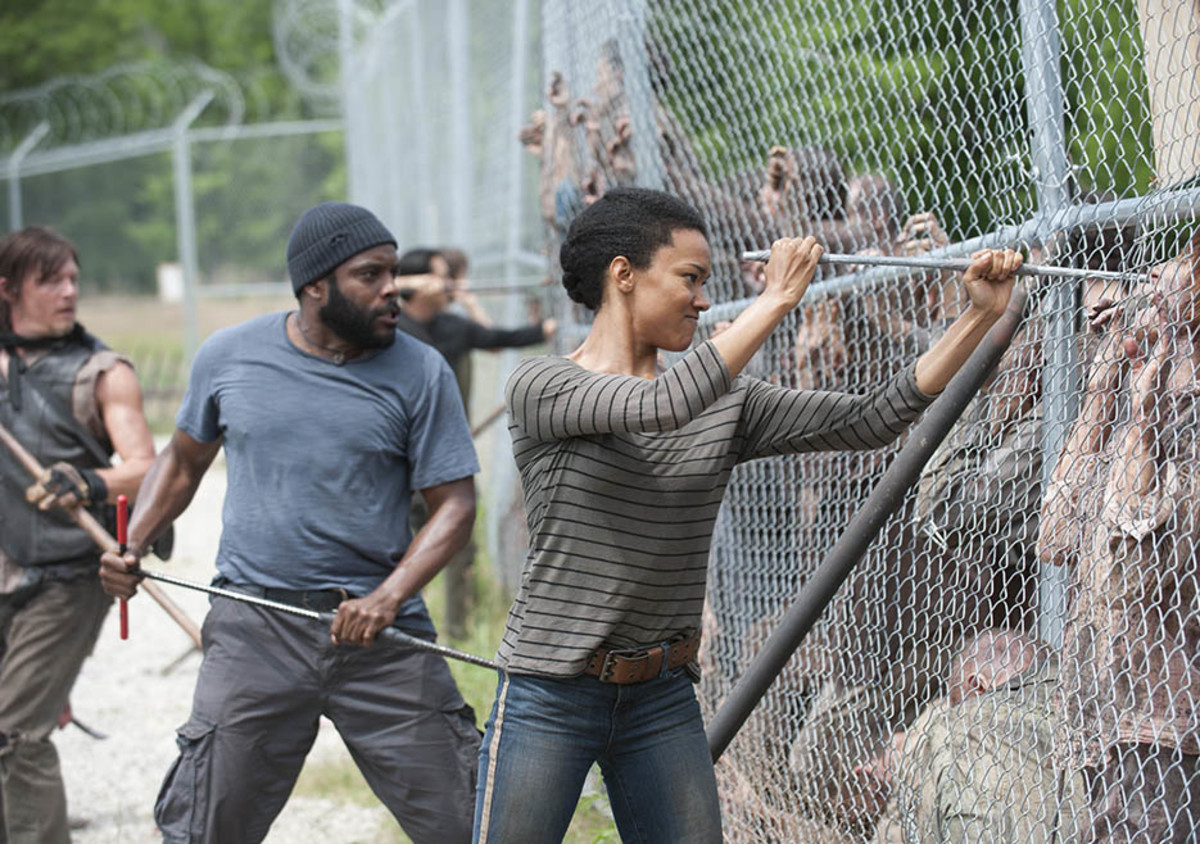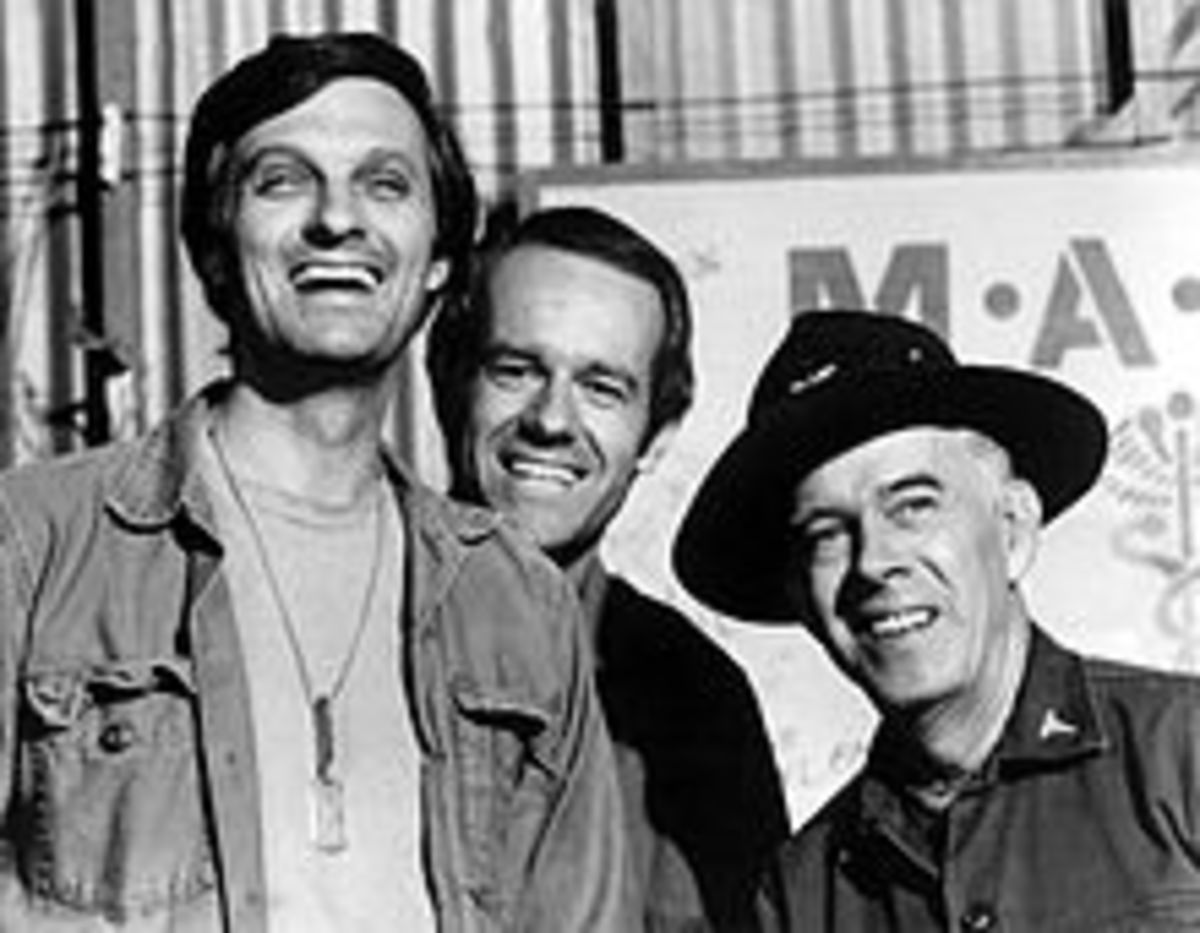Why The Walking Dead is Good for You
Rick Grimes Takes the Heat For You
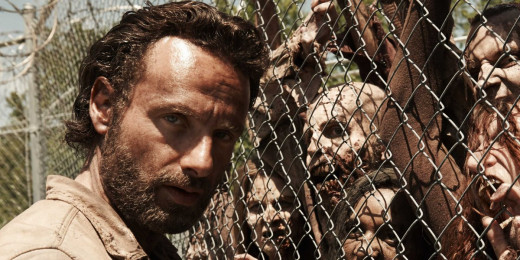
Mindfulness and Zombies
Three weeks ago I decided to check if The Walking Dead Season 4 was free on Amazon Prime. I'd been waiting in a kind of agony associated with the same niggling guilt I feel when I need to catch up with an old friend. Ever-present anticipation and delayed gratification. I consoled myself the wait was good for me, and paying around £20 for the series was most definitely NOT good.
On October 31st, 2015 the day finally arrived, and Season 4 was free on Amazon Prime. By November 4th I'd watched all 16 episodes, spent half a day prancing around the house practising my knife-weilding zombie-killing moves and returned to Amazon Prime and purchased Season 5.
By November 9th I'd watched all of Season 5 and was contemplating buying Season 6 episode by episode, but thankfully, some sanity remains with me as the total cost of this would be around £32. I've decided I'm not paying that for a session of boxset-binging. That's one step too far.
I've had a few days now to re-assess my loss of conscious thought and reality over the last few weeks. I could feel the guilt stealing in. That I'd achieved nothing substantial. I'd worked, earned, watched normal TV with the family, cooked, cleaned and slept as usual. The only difference was every waking, spare moment was spent with Rick Grimes and The Walking Dead cast, or whomever was left of them, at any one time.
Last night I had an epiphany. I discovered there is some serious psychological study going on out there which seems to prove that for some of us, binge-watching a boxset or two is a way of using escapism to re-charge our batteries. A way to invigorate our mental health, de-stress, and zone-out from the hundreds of jobs we set ourselves, spending some much needed "me" time.
Boxset binging is a way to exist completely in the present, using your senses of sight and sound to engage with an unfolding drama that keeps you hooked and satiated.
Why The Walking Dead Keeps You Relaxed
A long time ago it seems, Public Enemy wrote the lyric "television, the drug of the nation, breeding ignorance and feeding radiation". Perhaps they had something right about the aspects of drug-like addiction we can have with some TV shows.
In The Walking Dead there are several dramatic devices I'm addicted to. Without being too sophisticated, they include:
- When the group stop roaming can they make the new place safe?
- When the group inhabit a new place, how will it eventually be overrun and attacked?
- I like to watch Darryl a lot, and find myself eliminating all negative voices with this one thought: is that his real hair?
- How many lines of dialogue were in the episode I just watched?
- Why don't they organise regular culling of the zombies in their spare time?
- Will anyone ever find a cure?
And it is the last dramatic device that got me to go back to Season 1, instead of waiting for Season 6 and the blank void it left in my life. I'm looking for clues to see if I've missed anything that could help me predict what happens ahead of what I've seen so far. I'm watching it all again from the beginning.
Why The Walking Dead Encourages Mindfulness
Mindfulness is a very simple concept which it is possible to relate to the plot and construction of a series such as The Walking Dead. Mindfulness means paying attention in a particular way, and the overarching plot of the show is to be consistently aware a character can die at any point at the hands of zombies or other nasty versions of humanity. Right from the onset you are positioned as a survivor of a zombie apocalypse, albeit of a neo-classical nature. To adopt a neo-classical view of life is to be interested in how previous civilisations dealt with day-to-day living, and in The Walking Dead, characters are forced to use skills to survive most attributed to past human civilisations that lived a simpler existence akin to hunter-gathering. A viewer might, for example, spend time wondering if they should learn how to skin and gut a rabbit. Might that come in handy one day?
Mindfulness means giving your attention on purpose - the series re-inforces the concepts of survivalism, prepping, Darwinism and progressive human values. What is revealed during stressful situations, is the group values individuals who can lead them to survive with the same fervour as others who remind them of a higher humanity. This creates much of the drama in the series.
Or, to invert that idea, in times of peace and procreation humanity is at its most fortunate, yet the need to start surviving as the fittest brings to the surface dark actions. To save weaker, less brutal members of the group involves cost. With each season, and the lengthening zombie crisis, the group gets tougher and is prepared to sacrifice less, figuring people should have learned not to do certain things by now that get people killed.
"We are the Walking Dead"
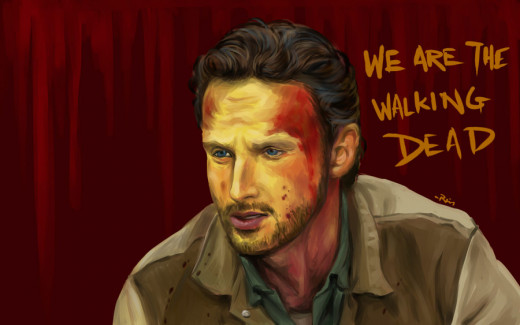
Attitudes of Mindfulness in The Walking Dead
Mindfulness means operating in the present moment. Rick Grimes, the leader of the group, gives many inspirational pep talks to his group of survivors. In Season 5 he speaks of his grandfather's waking attitude during World War II; "... and he got up every single day and decided he was already dead ... that was how he dealt with the Germans ...". It was only when the war ended his grandfather decided he was alive once more. Until that time, he became one of "the walking dead", part of the war, part of the fight. It is a lesson in how to adopt a successful mindset for each and every survivor. For the viewer, it is a lesson in how to get through tough times.
Mindfulness requires an attitude of non-judgementality. Consistently, in The Walking Dead, it is the less-tolerant and ignorant who get themselves killed. Rapists, murderers, liars, thieves, the insane, the over-pious, the over-cautious, the weaklings, the cowardly, the pacifists, the fussy-eaters, the over-controlling, double-crossing dictators, and basically anyone who ever wronged anyone seems to justifiably die. The group hardens into a determined bunch of people who've discovered being a good human being, who can be relied upon under pressure, is the most valuable commodity. The idea of this is explored in Season 5 as Rick's people try to settle into a gated community, where another group less-touched with violence thrives in luxurious conditions. They don't try to kill the members of this weaker, softer community, but the reality of the dangers "out there" means eventually there are casualties. Yet, remaining non-judgemental about the fortunes or mis-fortunes of others, is the dominant mindset for survival.
The Walking Dead Carol kills Lizzie
The Results of Mindfulness
Mindfulness is operating a mental state where you are are focused on the present moment while calmly acknowledging and accepting any feelings, thoughts and bodily sensations that pass through your system.
Being able to do things calmly, means mindfulness becomes therapeutic. Watching a TV boxset where the raw ethics of human survival play out in a way that reinforces the goodness of humanity is invigorating. At the same time, the zombies act as a vehicle to "cull" humans who don't fit models of ethical correctness, or are unable to react with calm. This is what makes The Walking Dead a successful show. The therapy aspect comes into it when you acknowledge the pure escapism of it all. The Walking Dead transports you into a re-set version of modern society where civilisation goes backwards slightly, and so do you. The pleasure derived from the series is in the nostalgia created by a simpler storyline where black is black and white is white and the zombies make the enforcement of decent values compulsory. It's a safe place to explore your personal unease with the values expressed by actual current society.
The deaths, violent confrontations and gore must be calmly accepted by audience and characters, as necessary to the overall survival of Rick's group of "walking dead".
Asking yourself if you would have done any differently permeates the viewing experience. You become married to the drama, and this is the ultimate definition of mindfulness, to focus on something with purpose. This is what makes the series addictive. You can't wait to engage with the questions raised by concepts of purpose. What is a human being? How would you deal with life in Georgia, USA during the time of a neo-classical zombie apocalypse?
If you'd asked me that question five years ago, I would have called you crazy!
The Walking Dead Experience
Do you feel everything is right with the world after watching a few episodes?
Mishone and her Husband and Friend
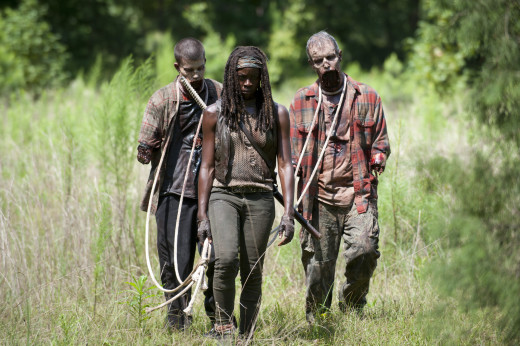
Daryl - Neo-Classical Man

Final Word
If you've ever boxset binged in your life, don't feel guilty about it. Take inspiration from this article in The Week called "The Science behind our insatiable need to binge-watch TV":
"Based on a survey commissioned by Netflix in December, 61 percent of 1,500 online respondents claimed to binge-watch Netflix regularly ... Three-quarters reported having positive feelings in doing this.
The company then sent cultural anthropologist Grant McCracken into the homes of TV streamers to find out why... 76 percent said binging was a welcome refuge from their busy lives, and nearly eight in 10 people said binge-watching a TV show made it more enjoyable than watching single episodes ... McCracken concludes that we're actually craving the long narratives that today's good television can provide. Instead of dealing with the day's stresses by zoning out, we'd rather become engrossed in an entirely different (and fictional) world."
Right ... I'm just going to check if episode 6 is out yet of The Walking Dead Season 6!

© 2015 Lisa McKnight





